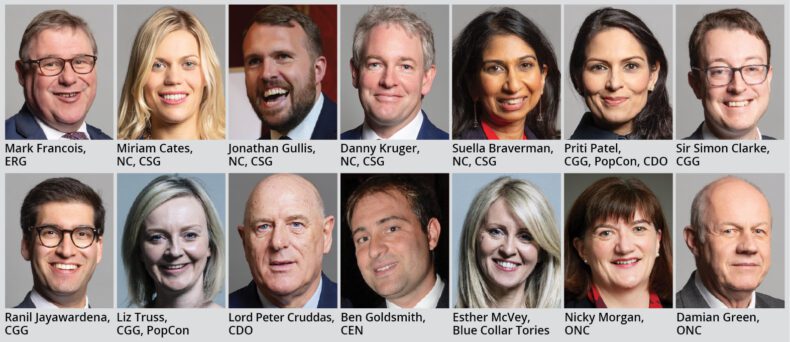
By Martyn Lester
At the end of 2023, when unruly factions of Conservative MPs were demanding that the UK left the European Convention on Human Rights (ECHR) to make it easier to dump asylum-seekers in Rwanda, most normal people will have been mystified to hear the agitators described in the media as “The Five Families”.
The press may have happily picked up and run with this shorthand phrase for “the Tory rabid right”, but the term was almost certainly coined by the swivel-eyed loons themselves as a self-aggrandising boast. It is borrowed from 1930s New York, when the five families referred to were the leading Mafia clans of the day.
Although it may seem preposterous for such genteel figures as Jacob Rees-Mogg to suggest that they somehow class as “made men”, the idea of Conservative factions having Mob equivalence is not new. Most notably, back in 1974 the faction plotting to oust Edward Heath as party leader and replace him with Margaret Thatcher was dubbed “The Milk Street Mafia”.
Keeping track of Conservative Party factions is about as easy as herding coke addled cats on a recently resurfaced ice-rink. Still, there is an election coming, and these fractious factions will be fighting tooth and nail to ensure that their hobby-horse policies feature in some shape or form. So, let us have a go at identifying as many as we can of the current cabals.
There is no official list of the Five Families factions, and I have seen at least seven proposed as members, but the first five listed below are those most often cited.
1 European Research Group (ERG)
Although it has at times seemed able to call on 80 or even 100 Commons votes, the European Research Group (ERG) membership is looking rather smaller than it once did: one recent estimate was more like 30.
This is partly due to the fact that some of its greedy members decided to apply for their ERG annual subscriptions to be refunded via MPs’ expenses claims, and were “outed” by the parliamentary authorities, and it would seem that a lot of those 80-plus ERGonauts were not too keen on seeing their names on a public list. You can, though, still expect to see them all filing into the same voting lobby at crucial moments, so the group remains potent.
The ERG is composed of people who describe themselves as “Eurosceptics”, which seems something of a misnomer. Their minds have always been thoroughly made up about the European Union (they hate it) so it is hard to see where there is any scepticism involved.
ERG power was at its peak between the 2016 referendum and Brexit actually coming into force, a time when they could make negotiations with the EU as difficult as possible. In stymying Prime Minister Theresa May over Europe at every opportunity, they effectively killed off her premiership.
In their pomp, they were lined up behind Rees-Mogg. These days it is the rather more hard-of-thinking Mark Francois. Now there is a man who probably likes all this “Mafia” talk. Keen to be seen as a roughie-toughie type, Francois loves to remind everyone that he is an Army Man – although he is really only a platoon leader in the Territorials.
2 Northern Research Group (NRG)
The Northern Research Group (NRG), numbering 50 to 60 MPs, will wield a fair amount of clout over the coming months, although ultimately it is likely to prove the equivalent of a relegation club.
The reason for this power-now-but-little-later status should be evident from its name. The NRG is a collection of mostly northern English MPs, many of them in the so-called Red Wall seats that fell to the Tories at the 2019 general election because voters there wanted to “Get Brexit Done”.
Anti-EU sentiment, however, is going to count for very little in this year’s election and these MPs are feeling very vulnerable. The most pessimistic (from their point of view) analysis of opinion polling says that the Conservatives may end up with as few as 90 MPs, and seats that were lost by Labour under Jeremy Corbyn are likely to turn out to have been borrowed by the Tories rather than secured.
The NRG will be looking for manifesto pledges calculated to appeal to Midlands and northwards right-ish working and lower middle-class voters. Immigration and levelling up are likely to feature much more prominently than stockbroker belt concerns such as inheritance tax.
Former party chairman Sir Jake Berry founded the group, and it is chaired by Carlisle MP John Stevenson.
3 The New Conservatives (NC)
As fresh to the scene as the name suggests, and possibly boasting no more than 25 members, the New Conservatives (NC) is nonetheless a group with rapidly growing influence, not least because it features a number of relatively youthful rising stars compared with the effete old lags of most party factions.
Especially visible is the 2019-elected Miriam Cates, who is barely over 40, blonde and moderately photogenic. These are superficial attributes, but among the predominantly late-middle-aged, male and white party membership out in the shires, this is the kind of thing that gets the sap rising in their near-dead branches.
Cates made something of a splash at last year’s National Conservatism conference in London by calling for a rise in the UK’s birth rate – despite Britain being too overcrowded to take in any immigrants. Co-founder Danny Kruger was also one of the 2019 intake and, along with Cates, he is an evangelical Christian who likes people to know it. Eton, Edinburgh and Oxford will do him no harm on his way up the greasy pole. Jonathan Gullis is another fast-emerging darling of the “anti-woke”. At the age of just 34, he is already a party deputy chair.
NC will probably not have a huge impact on the manifesto (with a policy list of immigration, immigration and immigration they are pushing at an open door), but more of one after what looks like an inevitable election wipe-out. Expect to see them pushing for rabid Cruella Braverman as next party leader, and clamouring for front bench roles if she gets in.
4 Common Sense Group (CSG)
Also considered a pro-Suella De Vil faction, the Common Sense Group (CSG) is chaired by close Braverman ally Sir John Hayes. Although it does not hustle itself into the media as much as some groups, it is said to have a membership of up to 60, so is probably numerically larger than both the ERG and NC.
Its relatively low public profile perhaps stems from the fact that many of its people are simultaneously members of other factions, and are often perceived as speaking for those, rather than the CSG – for example Cates, Kruger and Gullis (see above) are usually considered members.
Like all of the right-wing Tory factions, it takes a hard line on immigration, but the “culture war” is probably its speciality – expect some staunch rants on Black Lives Matter, Extinction Rebellion and the National Trust (unbearably “woke”).
The group is also much exercised by what it likes to call “the nanny state” and will be giving PM Rishi Sunak short shrift regarding his (admittedly daft) plans for a rolling recalculation of the minimum age limit for smoking.
The faction’s punch has been reduced a little by the unceremonious departure of disgraced former party deputy chair “30p Lee” Anderson.
5 Conservative Growth Group (CGG)
Considering the Tories are now in a massive amount of extra electoral ordure because of the short but insane prime ministership of Liz Truss, you might imagine that the list of party movers and shakers would be devoid of her pals. Not so.
One of the newest of the factions to sit in the Five Families, Conservative Growth Group (CGG), was more or less explicitly set up to carry on the work of the Truss premiership. Yes, it sounds unfathomable that a PM who was outlasted by an unrefrigerated lettuce might retain a line of cheerleaders, but Truss can boast about 50 of them.
What you need to understand here is that none of it was her fault. Yes, she perhaps gave Kwasi Kwarteng too much slack, but her policies were exactly right. She was let down by the panicky markets, panicky media, panicky voters, unsupportive civil servants, faintheart colleagues, sniper Sunak – the list goes on.
Not only are there 50 libertarian Truss fans clamouring for lower taxes and reduced regulations, but some are far from faceless backbenchers. Former Home Secretary Priti Patel is on board, as is Sir Simon Clarke, who served on the front benches of Boris Johnson as well as Truss. The group is chaired by Ranil Jayawardena, who also spent more than two years as a middle ranking Johnson minister.
Popular Conservatism (PopCon)
Before we leave Truss, it should be noted that she is front and centre of another outfit that many in the media describe as a “Conservative Party faction”, though I am not so sure.
PopCon was launched by Truss, but also by former Institute of Economic Affairs director Mark Littlewood, who is not a Tory politician, past or present. There were certainly MPs present at the launch including Patel, and Rees-Mogg and Anderson even spoke from the platform. But other characters floating around included Nigel Farage, who was using the cover that he was a “journalist with GB News”, but was clearly there to sniff around for his own potential benefit.
The fact that this group’s name is Popular Conservatism (cf New Conservatives) strongly suggests that its purpose is to be an umbrella, rather than a strictly party-aligned body.
No Turning Back (NTB)
Regarded by some as a Five Families member, but in my book no longer an influence in quite that league, No Turning Back (NTB) is way older than any of the other groups we have looked at so far. Its name was taken from Margaret Thatcher’s 1980 conference speech (“The lady’s not for turning…”) and its purpose was to be a bulwark against backsliding with regard to the Thatcherite agenda.
NTB’s drift down the league table of Tory groups probably has three causes. It was set up in the 1980s, and a lot of its members have departed since then. It was set up on pretty much the far right of the party, but today’s Tories are so much farther to the right than in those days that there is no longer a line to be guarded.
And even 20 years ago, the group had internal logical contradictions. Thatcher wanted Britain to run Europe. She badgered the other EU members into setting up the Single Market. She was a sceptic (in the proper, not ERG sense) but not a Brexiteer. Guarding Thatcher’s legacy and taking Britain out of the EU are, I would argue, incompatible aims.
But somehow NTB keeps going, and occasionally barks out some public “Keep the Faith” kind of announcement. I believe that it is still chaired by John “the Vulcan” Redwood. If so, he has been doing that job for nearly 20 years.
Conservative Democratic Organisation (CDO)
The biggest axe ground by Conservative Democratic Organisation (CDO) is one of internal party mechanisms. The group was only founded at the end of 2022, to bemoan the “coronation” of Sunak as new party leader and Prime Minister.
In fact, that was the second change of leader/PM of the last four to have gone through without a party membership vote (May pulled off the same stunt). And there was some obvious jiggery pokery involved in cutting out Penny Mordaunt to get Truss into the frame. But only Sunak bothers them.
They are, I would suggest, simply Borisites. Their gripe with Sunak is that he backstabbed their hero, and they are going to make him pay. But there is no obvious immediate future for a “bring back Boris” campaign.
Still, they do have some biggish names on their books: founder Lord Cruddas is president, Tory turned UKIP turned back Tory (and Freedom Association stalwart) David Campbell Bannerman is chairman, and one of its key public speakers has been Patel (yes, her again).
China Research Group (CRG)
Although set up by Conservative MPs, this is more of a single issue lobby than a party faction proper. In part modelled on the ERG, it urges a hawkish stance on China at just about every level imaginable. It will undoubtedly try to nudge something “Sinosceptic” into the manifesto, but this year’s election campaign is not going to focus on China!
Net Zero Scrutiny (NZS)
Internal branding for Tories persuaded by the aims of the charity Global Warming Policy Foundation and its uncharitable spin-off, the Global Warming Policy Forum. Part of the notorious 55 Tufton Street network (think TaxPayers’ Alliance, Leave Means Leave, Institute of Economic affairs and so on), this is another single-issue lobby. Let us just call them “climate denialists” and move on, shall we?
Conservative Environment Network (CEN)
Run by Ben Goldsmith (older brother of Zak), this is arguably more than a single-issue lobby, since the environment is so multifaceted. Goldsmith is genuine in his environmental passions, but it is questionable how much this forum can achieve. It boasts about 130 MPs and peers among its ranks, but how many are simply paying lip service? If 130 legislators cared that much, would our rivers be turd crusted and Boat Race crews throwing up from E coli?
Blue Collar Conservatives (BCC)
Also at least 130-strong, but again one has to wonder whether this potential powerhouse actually succeeds in anything. It was founded in 2012 by Esther McVey and relaunched in 2019 as a caucus of Tory MPs who regard themselves as working class. But ask yourself: How often do I hear spokespeople from, say, the New Conservatives on the radio and TV? Quite often, I’ll bet. And how often from the Blue Collar Conservatives? Admit it, you had never heard of them until 30 seconds ago.
One Nation Conservatives (ONC)
What are the One Nation Conservatives (ONC) doing right down here? you ask. They are a genuine caucus and, with 110 MPs, bigger than any of the Five Families. And these are very fair points. Their problem is that they are moderates (by Conservative standards), do not shout all that loud, and are all but ignored by prime ministers.
Although the idea of “one nation conservatism” stretches back to Disraeli and held sway until Thatcher became party leader, the ONC was only formed in 2019, as a caucus to try to ensure that a candidate who did not favour a no-deal Brexit won the coming party leadership election.
In the event, Johnson won, and appeared to appease the caucus by appointing both of its chairs, Nicky Morgan and Amber Rudd, to his front bench. With hindsight, it may be argued that he bamboozled them. When Johnson decided to withdraw the whip from 21 MPs, ONC demanded that he reversed the decision. Nearly two months later, Johnson reinstated just 10. The gap was long enough and the reinstatement small enough that it was clear Johnson had in essence told the ONC to eff off. Despite imposing membership numbers, it will probably get the same message from Sunak.
The group is chaired by May’s deputy prime minister (in all but name) Damian Green.
This article first appeared in the Spring 2024 issue of Searchlight magazine






Martyn Lester says
The ERG’s membership has (presumably) just fallen again. Carpet-biting anti-immigration stalwart Natalie Elphicke has left the party and been embraced by… er… Labour. You couldn’t make some of this stuff up!